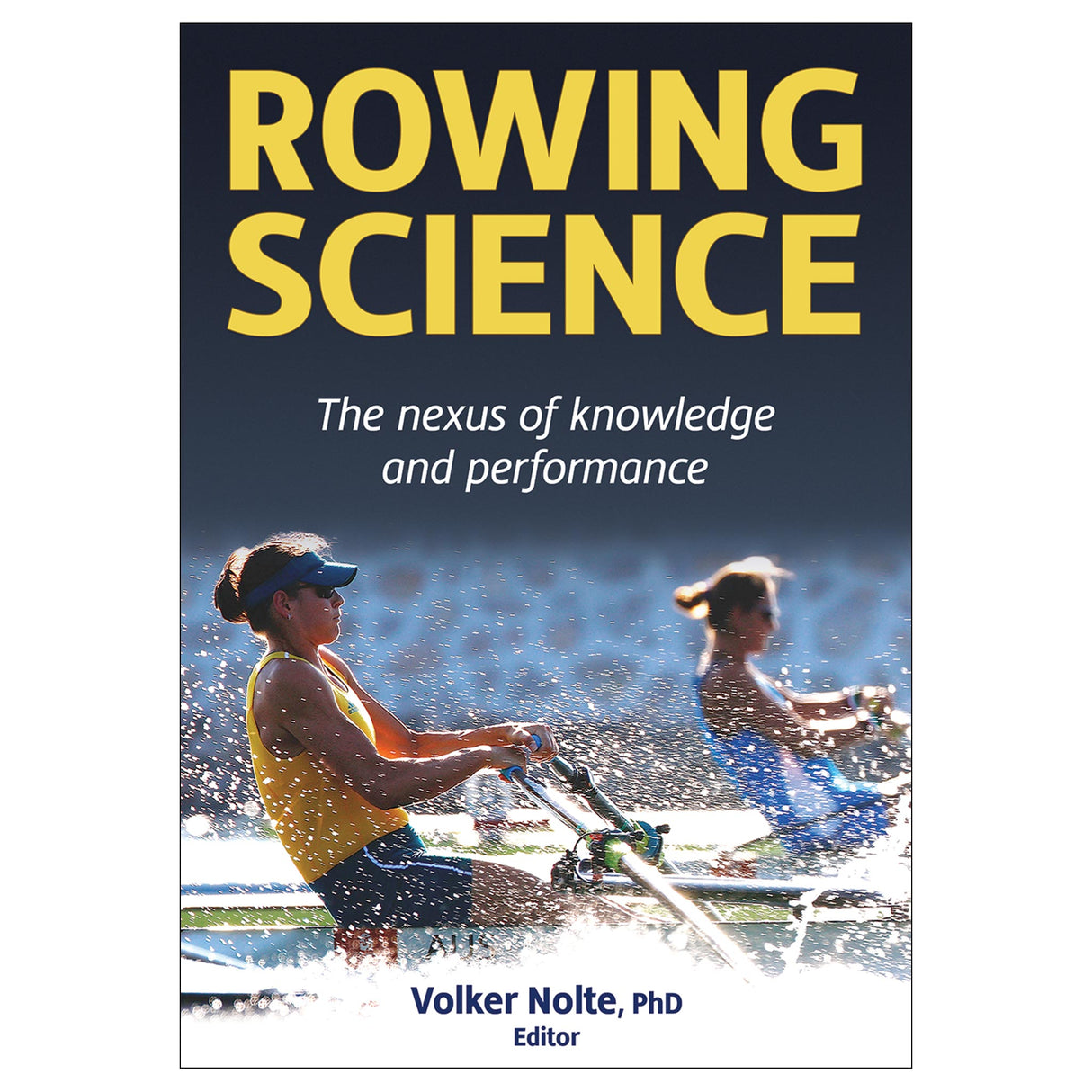Paperback
Rowing Science
Author: Volker Nolte
$52.95 CAD
Unit price
/
Unavailable
Paperback
$52.95 CAD
$52.95 CAD
Paperback
Master the swing with advice from a class of rowing’s elite. Rowing Science offers serious rowers and coaches the in-depth, evidence-based information needed to optimize rowing skills and elevate performance.
Dr. Volker Nolte, a world-renowned rowing expert and coach, is joined by the world’s top sport scientists as they explain the latest research and apply it across all aspects of the sport. The depth and scope of content are unmatched, as the text provides long-needed insights on topics like these:
The perfect blend of science and application, Rowing Science takes you inside the sport, into the training room and research lab, and onto the water. It’s a remarkable work and is a must-own for any rower who’s serious about performance.
Dr. Volker Nolte, a world-renowned rowing expert and coach, is joined by the world’s top sport scientists as they explain the latest research and apply it across all aspects of the sport. The depth and scope of content are unmatched, as the text provides long-needed insights on topics like these:
- The role of biological attributes, physiology, and metabolism in rowing success
- The biomechanics of stroke efficiency
- Critical components of rowing training programs
- Nutrition and injury prevention
- Mental toughness
- The importance of team culture
The perfect blend of science and application, Rowing Science takes you inside the sport, into the training room and research lab, and onto the water. It’s a remarkable work and is a must-own for any rower who’s serious about performance.
Audience
Serious rowers, rowing coaches, strength and conditioning specialists, and rowing scientists who work with rowers. Introduction. The Study and Knowledge of Rowing
Volker Nolte
Part I. The Role of Biological Attributes vs Practice in Rowing Success
Chapter 1. The Genetics of Performance
Paula Jardine
Chapter 2. Biological Maturation
Paula Jardine
Chapter 3. Neurobiology of Rowing
Paula Jardine
Chapter 4. Mileage Makes Champions
Paula Jardine
Part II. Rowing Mechanics for Efficiency and Effective Technique
Chapter 5. Biomechanical Principles for Stroke Efficiency
Volker Nolte
Chapter 6. Optimal Rowing Technique
Volker Nolte
Chapter 7. Biomechanical Principles to Optimize Rowing Performance
Volker Nolte
Chapter 8. Shell Design
Glen Burston and Dan Bechard
Chapter 9. Equipment and Rigging to Individual Anthropometry
Volker Nolte
Part III. Physiology of Rowing
Chapter 10. Overview of Rowing Physiology
Gunnar Treff and Brett Smith
Chapter 11. Rowing Metabolism
Gunnar Treff
Chapter 12. Physiology of Rowing Strength, Speed, and Power
Ed McNeely
Chapter 13. Environmental Stress
Stephen Cheung
Part IV. Practical Issues and Components of Rowing Training
Chapter 14. Principles of Exercise
Brett Smith
Chapter 15. Aerobic and Anaerobic Rowing Conditioning
Brett Smith
Chapter 16. Resistance Training
Ed McNeely
Chapter 17. Cross Training
Ed McNeely
Chapter 18. Distance-Specific Training
Volker Nolte
Part V. Practical Application
Chapter 19. Designing Training Programs
Brett Smith
Chapter 20. Monitoring Training
Brett Smith
Chapter 21. Environmental Countermeasures
Stephen Cheung
Chapter 22. Recovery
Ed McNeely
Chapter 23. Tapering
Ed McNeely
Part VI. Sports Medicine for Rowers
Chapter 24. Principles of Rowing Injuries
Jane Thornton
Chapter 25. Mechanisms and Management of Rowing Injuries
Jane Thornton
Chapter 26. Medical Aspects of Rowing and Special Populations
Jane Thornton
Part VII. Rowing Nutrition
Chapter 27. Fueling Strategies
Susan Boegman
Chapter 28. Optimizing Energy
Susan Boegman
Chapter 29. Supplements
Susan Boegman
Part VIII. Psychology of Rowing
Chapter 30. Motivation and Psychological Skills for Optimal Performance
Penny Werthner
Chapter 31. Building an Effective Team Culture in Rowing
Penny Werthner
Epilogue. The Future of Rowing
Volker Nolte
Volker Nolte
Part I. The Role of Biological Attributes vs Practice in Rowing Success
Chapter 1. The Genetics of Performance
Paula Jardine
Chapter 2. Biological Maturation
Paula Jardine
Chapter 3. Neurobiology of Rowing
Paula Jardine
Chapter 4. Mileage Makes Champions
Paula Jardine
Part II. Rowing Mechanics for Efficiency and Effective Technique
Chapter 5. Biomechanical Principles for Stroke Efficiency
Volker Nolte
Chapter 6. Optimal Rowing Technique
Volker Nolte
Chapter 7. Biomechanical Principles to Optimize Rowing Performance
Volker Nolte
Chapter 8. Shell Design
Glen Burston and Dan Bechard
Chapter 9. Equipment and Rigging to Individual Anthropometry
Volker Nolte
Part III. Physiology of Rowing
Chapter 10. Overview of Rowing Physiology
Gunnar Treff and Brett Smith
Chapter 11. Rowing Metabolism
Gunnar Treff
Chapter 12. Physiology of Rowing Strength, Speed, and Power
Ed McNeely
Chapter 13. Environmental Stress
Stephen Cheung
Part IV. Practical Issues and Components of Rowing Training
Chapter 14. Principles of Exercise
Brett Smith
Chapter 15. Aerobic and Anaerobic Rowing Conditioning
Brett Smith
Chapter 16. Resistance Training
Ed McNeely
Chapter 17. Cross Training
Ed McNeely
Chapter 18. Distance-Specific Training
Volker Nolte
Part V. Practical Application
Chapter 19. Designing Training Programs
Brett Smith
Chapter 20. Monitoring Training
Brett Smith
Chapter 21. Environmental Countermeasures
Stephen Cheung
Chapter 22. Recovery
Ed McNeely
Chapter 23. Tapering
Ed McNeely
Part VI. Sports Medicine for Rowers
Chapter 24. Principles of Rowing Injuries
Jane Thornton
Chapter 25. Mechanisms and Management of Rowing Injuries
Jane Thornton
Chapter 26. Medical Aspects of Rowing and Special Populations
Jane Thornton
Part VII. Rowing Nutrition
Chapter 27. Fueling Strategies
Susan Boegman
Chapter 28. Optimizing Energy
Susan Boegman
Chapter 29. Supplements
Susan Boegman
Part VIII. Psychology of Rowing
Chapter 30. Motivation and Psychological Skills for Optimal Performance
Penny Werthner
Chapter 31. Building an Effective Team Culture in Rowing
Penny Werthner
Epilogue. The Future of Rowing
Volker Nolte
“Volker Nolte’s work provides a legacy for every rower, researcher, and sport leader. It records the connection of theory to practice that lays the foundation for advances in rowing and in sport in general. In Rowing Science, Nolte and some of the world’s top sport scientists have come together to offer this one-of-a-kind resource for people interested in improving rowing performance and optimizing results at all levels.”
—Cam Kiosoglous, PhD, National Team Sport Science Director for US Rowing
—Cam Kiosoglous, PhD, National Team Sport Science Director for US Rowing






